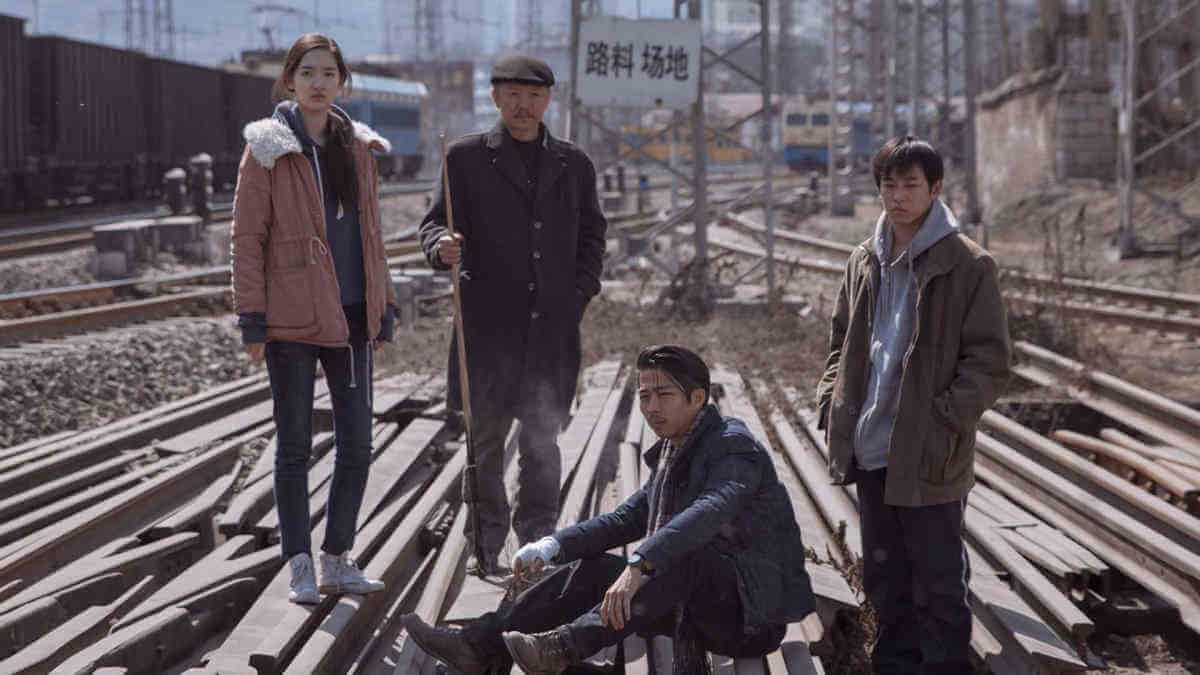Making a very long film says “this story warrants more than a casual two hours in a movie theater or, especially, in front of a TV set.”
While one can understand instantly why Claude Lanzmann thought his Holocaust documentary “Shoah,” which he spent years shooting, needed to be nine hours long, the rationale behind narrative films like Hu Bo’s “An Elephant Sitting Still” takes more consideration. While I was watching it, I felt a link to the Hungarian director Béla Tarr’s seven-hour “Satantango.” Afterwards, I learned that Hu studied with Tarr and made his short “Man in the Well” under his supervision.
Bleak tales of Chinese life outside the country’s biggest cities have become very familiar in its independent cinema. While “An Elephant Sitting Still” is three hours shorter than the “Sátántangó,” both rely on Steadicam tracking shots. They also use duration to build sympathy, even complicity, with characters whose behavior is sometimes nasty and unpleasant. But if “Sátántangó” is a tale of disillusionment starting from the premise that opening Hungary up after the fall of Eastern European communism would never improve its characters’ lives and only make them susceptible to false prophets, “An Elephant Sitting Still” begins with a sense of emptiness, taken as the norm for contemporary China (or just modern life as a whole), and gets darker from there.
The film takes place on one eventful day, cutting back and forth between four main characters whose lives intersect. High school student Wei Bu (Yuchang Peng) runs away after he throws a bully down the stairs, which results in injuries. He’s enamored of a fellow student, Huang Ling (Uvin Wang), who is dating the school’s vice principal. Petty gangster Yu Cheng (Yu Zhang) sees his friend commit suicide by jumping out of a window. To make matters worse, he’s had sex with his friend’s wife. Sixty-year-old Wang Lin (Congxi Li) decides to resist his son’s effort to send him to a nursing home and joins Wei and Huang as they prepare for a bus trip to the northern city of Manzhouli.
That destination represents something beyond a physical escape, even if that becomes increasingly urgent — the legend Wei has heard about an elephant in that city’s circus who sits still, immune to pain and ignoring the world around him, becomes the only symbol of hope these characters have.
I’ve waited this long to mention the fact that Hu committed suicide in 2017, while “An Elephant Sitting Still” was in post-production because I don’t want to romanticize it via the myth that it lends authenticity to his film’s grimness. (Someone on Letterboxd called it “a cry for help,” which is awfully reductive.) Any 29-year-old man’s suicide is tragic. His film shows that he was a great talent who was just getting started. He had also worked as a writer, and this film is adapted from one of his stories. His death led to legal wrangling over the film’s release, with his family getting its rights over producer Wang Xiaoshuai.
“An Elephant Sitting Still” uses Hu’s style to suggest that its characters live inside a shrinking cage, even though at least half the film takes place in open air. He frames his actors in close-up, sometimes extreme ones. His images are claustrophobic and cluttered. He fills the screen with people. The lighting and cinematography are always dim and gray, taking film noir at its word, and the sky, too, is perpetually gray. While the film is set over one day, it obviously wasn’t shot in one, and great care went into the consistency of its wintry look.
“An Elephant Sitting Still” heats up to a series of amazingly blunt, cruel confrontations. Hu didn’t hold back about the essential selfishness and spiritual emptiness of the world he depicts. But his film isn’t nihilistic. The concept of the title elephant is an on-the-nose metaphor. His characters’ dream of finding transcendence in Manzhouli is rather ludicrous if taken literally. However, it’s the only means they have to expect anything better than accelerating entropy.
The social and political reasons behind all this remain just off-screen, but it’s not hard to read them into the film. “An Elephant Sitting Still” shows the people who lose out on the unity and nationalism celebrated by mainstream Chinese cinema, and he himself was one of them. But there’s a reason it ends with an elephant’s trumpet blasting.
AN ELEPHANT SITTING STILL | Directed by Hu Bo | In Mandarin with English subtitles | KimStim | Opens Mar. 8 | Film Society of Lincoln Center, Elinor Bunin Munroe Film Center, 144 W. 65th St. | filmlinc.org



































